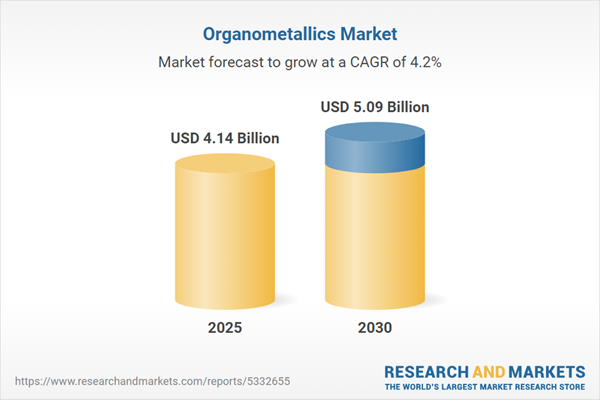Organometallic compounds are chemical compounds that have at least one link between a metal atom and a carbon atom from an organic molecule. This distinct connection frequently results in high reactivity and various characteristics. They have several uses in various domains, including catalysis, medicine, and materials research. Organometallic compounds include Grignard reagents, organolithium compounds, ferrocene, and Zeise's salt. These chemicals have important roles in organic synthesis, industrial processes, and the creation of innovative materials.
The worldwide organometallics market is expanding rapidly due to its diverse uses in various sectors. These chemicals have an important role in catalysis, allowing for efficient chemical processes and the creation of complex molecules. Their primary uses include manufacturing medicines, agrochemicals, and sophisticated materials. The growing desire for sustainable and creative solutions and advances in organometallic chemistry are moving the industry forward.
Organometallics market drivers
Growing demand from the pharmaceutical industry
The increasing demand from the pharmaceutical industry significantly drives the organometallics market. Because of their special properties, organometallic compounds are essential in drug research and development. They facilitate the synthesis of complex organic compounds necessary for producing new therapeutic agents.Moreover, the pharmaceutical industry continues its search for new drugs to meet unmet medical requirements. India, for instance, produces 60% of the world's vaccinations, meeting up to 70% of WHO demand for Diphtheria, Tetanus, and Pertussis (DPT) and Bacillus Calmette-Guérin (BCG) vaccines and 90% of WHO demand for measles vaccine as per Invest India. This, in turn, increases the demand for new organometallic catalysts and reagents, driving further growth in the organometallics market. Moreover, the total market size of the Indian pharma industry is expected to reach US$130 billion by 2030 and US$450 billion by 2047.
The organometallics market is segmented into five regions worldwide:
By geography, the organometallics market is segmented into North America, South America, Europe, the Middle East and Africa, and Asia-Pacific. The major economies like China, Japan, India, and South Korea dominate the Asia-Pacific region.Nonetheless, Asia-Pacific's organometallics market is spurred by fast industrialization in chemicals, petrochemicals, and electronics that demand organometallics in catalysts and advanced materials. Renewable energy, particularly solar energy and energy storage is also fuelling the market. Organometallic compounds are increasingly being used in pharmaceuticals and agrochemicals for drug development and crop protection. For instance, China's pharmaceutical sector has been gradually growing, and it is expected to reach $161.8 billion by 2023, accounting for about 30% of the global market. However, possibilities for US SMEs in the pharmaceutical industry are restricted since large Chinese pharmaceutical businesses and worldwide MNC pharmaceutical companies (including those based in the United States) have dominated the majority of market sales.
Several strong industrial and technological developments have been experienced in North America, such as manufacturing chemicals, pharmaceuticals, and material science, leading to organometallics market growth. Demand for efficient catalysts in processes, such as polymerization and chemical synthesis, and application in the drug development process and electronics enhance this market's expansion. The growing focus of North America on sustainable chemistry and green manufacturing, as well as incentives from governmental entities regarding clean technologies, is hastening the use of organometallics for eco-friendly catalysis in renewable energy applications. Advancing agrochemicals, ever-increasing demand for lightweight materials used for automotive and aerospace industry purposes, and advancements in energy storage drive up the market.
Reasons for buying this report:
- Insightful Analysis: Gain detailed market insights covering major as well as emerging geographical regions, focusing on customer segments, government policies and socio-economic factors, consumer preferences, industry verticals, other sub-segments.
- Competitive Landscape: Understand the strategic maneuvers employed by key players globally to understand possible market penetration with the correct strategy.
- Market Drivers & Future Trends: Explore the dynamic factors and pivotal market trends and how they will shape up future market developments.
- Actionable Recommendations: Utilize the insights to exercise strategic decision to uncover new business streams and revenues in a dynamic environment.
- Caters to a Wide Audience: Beneficial and cost-effective for startups, research institutions, consultants, SMEs, and large enterprises.
What do businesses use our reports for?
Industry and Market Insights, Opportunity Assessment, Product Demand Forecasting, Market Entry Strategy, Geographical Expansion, Capital Investment Decisions, Regulatory Framework & Implications, New Product Development, Competitive IntelligenceReport Coverage:
- Historical data & forecasts from 2022 to 2030
- Growth Opportunities, Challenges, Supply Chain Outlook, Regulatory Framework, Customer Behaviour, and Trend Analysis
- Competitive Positioning, Strategies, and Market Share Analysis
- Revenue Growth and Forecast Assessment of segments and regions including countries
- Company Profiling (Strategies, Products, Financial Information, and Key Developments among others)
The organometallics market is analyzed into the following segments:
By Type:
- Organotin
- Organolithiums
- Organoaluminium
- Organozinc
- Others
By End-User:
- Agriculture
- Electronics
- Automotive
- Pharmaceuticals
- Others
By Geography:
- North America
- South America
- Europe
- Middle East and Africa
- Asia-Pacific
Table of Contents
Companies Mentioned
- American Elements
- Sigma-Aldrich
- Albemarle Corporation
- Reaxis
- Nouryon
- Strem Chemicals Inc.
- Fisher Scientific
- GFS Chemicals
- BNT Chemicals
- Entegris
Table Information
| Report Attribute | Details |
|---|---|
| No. of Pages | 114 |
| Published | November 2024 |
| Forecast Period | 2025 - 2030 |
| Estimated Market Value ( USD | $ 4.14 Billion |
| Forecasted Market Value ( USD | $ 5.09 Billion |
| Compound Annual Growth Rate | 4.2% |
| Regions Covered | Global |
| No. of Companies Mentioned | 10 |









